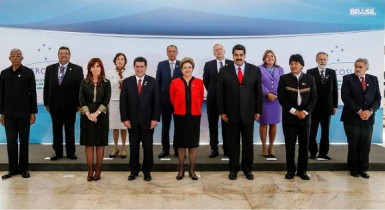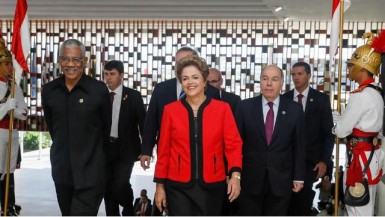President David Granger yesterday sought to enlist the aid of Mercosur member countries in defence of Guyana’s sovereignty from Venezuela’s renewed territorial claims.
During a speech at the 48th Mercosur Summit in Brasilia, Granger asked fellow leaders to “help this small State” in the “defence of its sovereignty” and “the integrity of its territory,” in reference to the territorial controversy with Venezuela, according to an El Universal report.
Known as the Common Market of the South, Mercosur consists of Brazil, Argentina, Uruguay, Paraguay and Venezuela as full members.
The report said Granger delivered his speech shortly after the address of Venezuelan President Nicolás Maduro, who also referred to the border controversy over the Essequibo region.

Granger was also reported as saying that Mercosur had “the duty” to be “vigilant” in the face of the conflict, and urged the leaders of the bloc to “ensure the sovereignty of the small States of the continent.”
It added that Granger openly criticised a decree signed by Maduro declaring all maritime waters off the Essequibo coast as Venezuelan territory.
El Universal also reported that Maduro announced that a special meeting will be held within the framework of the regional body to address the border controversy.
“I would like to thank you all for agreeing to call a special meeting of Mercosur in Asunción, Paraguay, at the end of August,” Maduro was quoted as saying during his speech.
Although the date of the meeting was not scheduled, Maduro welcomed the initiative from Mercosur and the possibility of fostering peace initiatives in the region, the report said.
He was also reported as telling fellow leaders that the Good Officer of the United Nations to mediate in the controversy was yet to be appointed by UN Secretary General Ban Ki-moon, and highlighted that such decision would also be announced by the pro-tempore presidency of Mercosur, as agreed in talks with Uruguayan President Tabaré Vásquez.
Foreign Affairs Minister Carl Greenidge has said the Good Officer process has run its course without yielding results in some 25 years.
“It has already been indicated by the previous government that the process of good officers has run its course. It can’t take us anywhere constructive and indeed I think the feeling is as it has evolved it has served as the cover, not deliberately on the part of the UN of course, but it has served for a cover under which Guyana’s sovereignty has been threatened (by Venezuela)…,” he said on Monday.

Greenidge added that the next functional step would be a judicial solution. “I don’t know what else you can do in terms of mediation when you think of what has been happening over the years and… the only option that is left would be for a judicial resolution of this matter that is our position,” he said.
Tensions between Guyana and Venezuela have flared up over the last few months since the latter issued decree 1787 on May 26th seeking to annex a vast expanse of Guyana’s maritime territory and portions of the zones of other Caricom countries.
Under unrelenting criticism from Guyana, including at the recent Caricom heads of Government summit in Barbados, Venezuela retracted the decree and issued another decree—1859—on July 6. However, it has not satisfied Guyana even though it removed all geographic coordinates.
It has been suggested that the second decree was aimed at quelling Colombia’s concerns so as to lessen the diplomatic pressure that was likely to build against Venezuela in South American groupings. Colombia had formally protested against the May 26th decree.
Greenidge on Monday noted that though the new decree “has not done much to attenuate the concerns of the Caricom countries, it, interestingly enough, seems to have done enough to at least assuage the most burning concerns of Colombia. Isn’t that interesting?”




